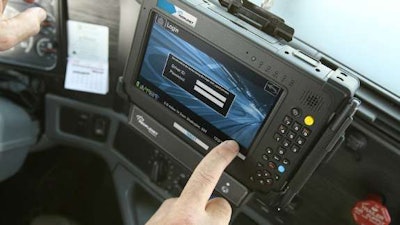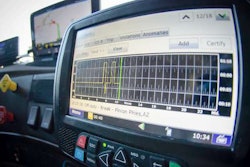
Drivers have received 35,000 citations since January for failing to have a registered electronic logging device, making it the top violation since the ELD mandate went into effect Dec. 18, 2017, says Annette Sandberg, CEO of TransSafe Consulting.
Typically, the non-registered device citation comes because drivers are using an AOBRD, which doesn’t need to be registered, Sandberg says. Drivers don’t know how to explain that it’s an AOBRD and law enforcement doesn’t know to ask the question, she says.
This is just one of many ELD implementation challenges Sandberg shared at the recent Spring Symposium in Hilton Head, S.C. staged by Commercial Carrier Journal. Others include uneven enforcement, lack of training, vendor issues and general confusion about data availability and exemptions.
Cited second most often since January are form and manner violations. “Part of it is a lot of ELD systems don’t require the driver to enter the trailer number or other nitpicky things and they are being written up,” she says. Also on the list are no record of duty status, false report of duty status, driving beyond the 14th hour and failing to preserve the last seven days of logs.
Carriers who adopted ELDs just before the December 18 deadline often didn’t have the time to adequately train drivers how to use the systems, she says. Many also lack expertise within their operation to integrate the systems into their back office. “Because of the rush to comply, lots of ELD makers just sent the equipment without proper training,” she says.
The sheer volume and lack of vetting of vendors has led to problems, Sandberg says. More than 200 unique manufacturers (21 of those are new since February) have registered 364 devices (53 new since February). Sandberg has worked with several carriers that have been through two and three manufacturers in an effort to find a system that works for their operation. One carrier’s ELD didn’t even meet the technical specs in the rule, Sandberg says.
ELD makers “self certify” their devices for inclusion in FMCSA’s list of compliant vendors so there is no third-party review and no government oversight. The agency has a process if there is suspicion that a vendor shouldn’t be on the list, but “they have yet to remove anyone,” she says. Fleets need to push hard to get problems corrected or hope that their contract gives them recourse in the event of a problem, Sandberg says.
FMCSA says they have no regulatory authority over ELD makers, only over carriers. Thus, the agency puts the burden of due diligence on the carrier, she says. “We think they should be more aggressive in going after bad ELD makers,” she says.
Because of unresolved issues with some of the systems, several carriers are going after vendors for contractual damages, Sandberg says. She believes a number of vendors will exit the market or get bought out by somebody else.
As the industry comes to terms with enforcement of the ELD mandate, Sandberg recommends carriers pay particular attention to:
- Unassigned drive time. Anytime a driver forgets to log in and they drive it will show up. Then the next driver must either except or reject that entry. “This is the first thing they ask for in an audit,” Sandberg says, “because they know this is a place drivers can try and falsify logs by not signing it.”
- Odometer jumps/skips when a driver unplugs the ELD to use the vehicle for personal conveyance. Carriers can avoid violations by having a personal conveyance policy for when FMCSA asks for the odometer skip report.
- Violations – FMCSA will ask for the violation report.
- Maintenance of supporting documents.
- Roadside violations. Challenge them when it appears enforcement made an error, she says.
- Audits. Carriers should know how to run reports and retrieve data in the event of an audit, Sandberg says. She does not recommend allowing inspectors to sit down at a terminal and look at their system. “Make them ask for specific drivers and give them a copy of the report,” she says. “They may ask for (access to your system), but you don’t have to do it,” she says.











